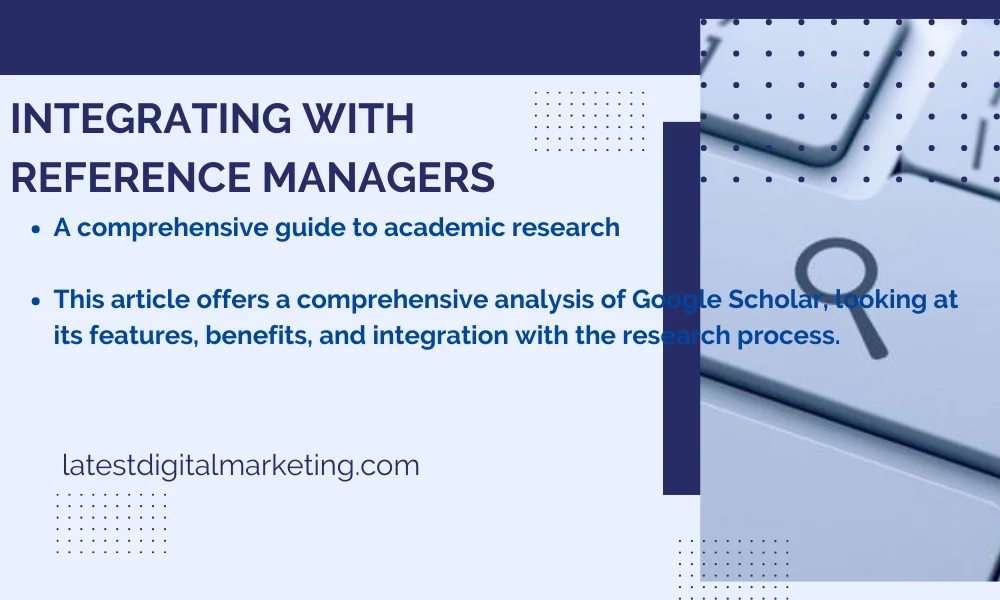Google Scholar
An extensive manual for academic research
In the world of academics, having access to reputable, academically sound material is essential. Here comes Google Scholar, a potent and crucial tool that has revolutionized the way scholars, researchers, and students find and access academic literature.
This article provides a thorough examination of Google Scholar, including a look at its functions, advantages, and integration into the research process.
Researchers and academics are always looking for trustworthy sources of information to support their studies and inquiries because knowledge is the currency of academia. Google Scholar is one such essential resource that has become a mainstay in the field of academic study.
With the help of this thorough guide, you’ll be able to take advantage of Google Scholar’s many features and advantages for your academic endeavors.

Introduction
The availability of knowledge in the digital era can be both a blessing and a burden. Finding reliable and pertinent sources is a significant part of the work of academics and researchers.
The answer is Google Scholar, which offers a user-friendly interface made specifically for academic use.
Google Scholar has transformed how scholars access scholarly material by becoming a flexible and user-friendly academic search engine. Google Scholar offers a plethora of features that can improve your research process, whether you’re a seasoned academic or a student starting your first research project.
Google Scholar offers a smooth experience catered to your particular needs, ranging from straightforward keyword searches to sophisticated filtering options.
How to Use the Interface
The deep capabilities of Google Scholar are hidden by the interface’s seeming simplicity. You can enter keywords, authors, or titles in the search field, which functions similarly to the standard Google search. The advanced search features and filters, however, are where the real magic happens. With the use of these tools, you may focus your search on particular phrases found in papers as well as authors, journals, and publication dates.
Understanding Search Results
The search results from Google Scholar are divided into books, papers, patents, citations, and legal opinions. You can narrow down the type of information you’re looking for by having a clear understanding of these categories. Furthermore, Google Scholar has the priceless function of citing articles and related works, which enables you to trace the history of a certain piece of study.
Accessing Full Texts
Full-text articles can occasionally be difficult to access, especially when behind paywalls. There are several ways to access these resources through Google Scholar, including direct links to publisher websites, pre-print archival services, and institutional libraries.
You may frequently get around paywalls and easily access content by connecting your institutional library account to Google Scholar.
Creating Personal Library
There are many benefits to creating a user profile on Google Scholar. You can set up research alerts for particular keywords, save and organize articles, and manage your citations with this tool.
With the help of this function, Google Scholar effectively becomes your individualized research helper that is suited to your needs and interests.
Alerts and Notifications
Research notifications are a vital resource for staying current in your industry. You can create alerts in Google Scholar for particular authors or phrases to make sure you never miss the newest information. You can choose how frequently you want to be notified and get updates.
Metrics and Citation Analysis
It’s critical for researchers to monitor the effects of their work. You may evaluate the reach and influence of a certain publication by looking at the citation counts that Google Scholar provides for individual articles.
While it’s crucial to not rely only on these measures, they do provide a useful overview of a paper’s importance.
Google Scholar for Authors
Google Scholar can assist you in reaching a larger audience if you’re an author. Your work will be more visible and accessible if you make sure it is indexed on the platform. Your academic reputation is improved by maintaining your author profile and carefully selecting your list of publications.
Tips for Effective Usage
Your searches can be greatly enhanced by becoming proficient with Google Scholar’s advanced search syntax. Knowing how to use operators like “AND,” “OR,” and “quotes” will enable you to craft searches that yield exact results. Maintaining the integrity of your research also requires being aware of frequent dangers like errors and out-of-date data.

Integrating with Reference Managers
For organising and citing your sources, reference management tools like EndNote and Zotero are crucial. By enabling you to export citations directly into these programme, Google Scholar streamlines the process of creating bibliographies.
Mobile App Benefits
The Google Scholar mobile app is a research game-changer in the quick-paced world of today. The software enables researchers to stay connected to their work wherever they are with features like offline access to stored articles and the capacity to quickly scan QR codes.
Google Scholar vs. Traditional Databases
Google Scholar provides a wider range of content than conventional databases like PubMed. While Google Scholar covers a larger range of subjects, PubMed concentrates on the literature in the biomedical field. For thorough research, striking the correct balance between different sources is crucial.
Overcoming Barriers to Access
Comparable databases like PubMed lack the breadth of content that Google Scholar does. While PubMed focuses on the literature in the biological sector, Google Scholar emphasizes on a wider range of topics. Finding the ideal balance between several sources is vital for successful study.
Ethical Considerations
It is crucial to uphold ethical research practices. It’s crucial to correctly cite your sources when using Google Scholar search results in your work. Maintaining academic integrity not only improves the quality of your study but also the credibility of the scholarly community.
Academic research has changed as a result of Google Scholar. It is a vital tool for researchers all around the world thanks to its user-friendly layout, sophisticated search features, and extensive access to scholarly literature.
You may confidently traverse the constantly changing academic landscape by utilizing Google Scholar’s features and continually modifying your research methods.
Google Scholar Citation
Certainly! The Google Scholar Citation function enables academics and researchers to monitor and highlight the influence of their scholarly work.
It makes it easier for authors to monitor who is citing their work, which is crucial for determining the impact and scope of their research.
The Genesis of Google Scholar
When Google Scholar was introduced in 2004, its goal was to develop a freely available web search engine that focused particularly on scholarly books, articles, theses, and patents. It aimed to close the accessibility gap between established academic databases and broader web search.
Google Scholar has emerged as a guiding star for academics and researchers looking for the best scholarly information sources in the ever-expanding world of internet resources.
This article explores Google Scholar’s unique origin story, following it from its birth to its status as a crucial resource for academic research.
Understanding the Features of Google Scholar
Google Scholar uses web crawlers to index academic material from a variety of sources, such as academic publishers, institutions of higher learning, and online repositories. Users can search across fields using a single interface and get results that include a variety of academic materials.
Advantages of Google Scholar
There are many benefits to using Google Scholar. It provides a substantial selection of academic information that is frequently free to access, enabling users to get around paywalls. Additionally, it offers easy access to a wide range of sources, facilitating thorough research on a particular subject.

How to Use Google Scholar’s Search to Its Fullest
Researchers may efficiently narrow their search and extract the most pertinent data by employing precise search terms, filters, and sorting results. The efficiency of utilizing Google Scholar is maximized by being familiar with the user interface.
Investigating Advanced Search Methods
Advanced search options available on Google Scholar include phrase searching, Boolean operators, and targeted field searches. These methods improve the accuracy of information collection and the caliber of study findings.
Google Scholar Search
With access to a massive repository of scholarly knowledge, Google Scholar serves as a beacon of academic illumination in the digital age.
This robust search engine is useful for everyone looking for trustworthy information on a variety of topics, not only scholars and academics.
We will explore Google Scholar’s features, advantages, and best practises in this essay as we go deep into this vital resource.
Google Scholar Citations: Monitoring the Effects of Research
On Google Scholar, authors can set up profiles to display their works and monitor citations. Understanding the impact and scope of one’s study within the academic community is made easier by this feature.
Integration with Institutions and Libraries
Many academic libraries and institutions have Google Scholar integrated into their systems, making it easy for users to access information and giving them an accustomed user experience for academic research.
Restrictions & Issues with Google Scholar
Google Scholar is an excellent tool, however it has several drawbacks. Concerns include the absence of strict quality control, the limited coverage of some subjects, and the potential inclusion of non-scholarly content.
Traditional databases versus Google Scholar
The key contrast in the use of Google Scholar vs. conventional academic databases is between convenience and precision. While traditional databases maintain stringent quality control and selected material, Google Scholar gives accessibility.
Security of Data and Privacy
Users should use caution while sharing material on Google Scholar because it is connected to their Google account. To protect personal information, it is essential to understand the platform’s privacy settings.
Tips for Using Google Scholar for Research
Users should make alerts, use the related articles feature, study the cited by and related works sections for in-depth coverage of a topic, and generate alerts to maximize research efficiency.

Platforms for Academic Research in the Future
AI and machine learning are becoming more and more important in the landscape of academic research platforms. More individualized recommendations and improved search capabilities might be on the horizon.
Conclusion
There is no denying Google Scholar’s influence on academic study. It has changed how scholars gather data and democratized access to intellectual content. Platforms like Google Scholar will be crucial in determining how scholarly research is conducted in the future as technology develops.
In conclusion, Google Scholar is a key tool for academic research that has completely changed how academics access and interact with scholarly material. It has democratized the quest for knowledge and streamlined the research process thanks to its simple interface, sizable database, and convenient search features.
Google Scholar has facilitated academic exploration by giving users access to a variety of scholarly materials, but it has also contributed to speeding the rate of discovery and invention.
We have examined the history of Google Scholar, its features, advantages, and drawbacks in this extensive post. We have looked at how it enables scholars to track citations, locate pertinent sources, and interact with the worldwide academic community.
Researchers should use critical thinking and discernment when assessing the sources and data they find using Google Scholar, despite the fact that it has many benefits.
Google Scholar will continue to play a significant role in influencing how academic research is conducted in the future as the digital environment changes. The platform is likely to change and add new features to meet the evolving demands of researchers as technology develops.
Google Scholar is positioned to maintain its status as a vital tool for researchers, students, and academics by utilizing the power of artificial intelligence, data analytics, and enhanced integration with other academic resources.

Google Scholar serves as a beacon of trustworthy and academic content in a world where information is abundant but judgement is essential, enabling scholars to significantly advance their areas.
Whether you’re a seasoned academic or a novice researcher, Google Scholar has an undeniable influence on the quest for knowledge, making it an indispensable travel companion.
FAQs (Frequently Asked Questions)
- Is using Google Scholar free? Yes, anyone with an internet connection can access Google Scholar for free.
- Can I believe the references in Google Scholar? Despite the fact that Google Scholar indexes scholarly literature, it is still vital to assess sources for trustworthiness and credibility.
- Can I use Google Scholar to obtain articles in full text? While some items can be read for free, some can call for a payment or subscription.
- Does Google Scholar cover all academic fields? Although it covers a wide range of academic fields, some specialized ones might not be as thoroughly covered.
- How can I set up a Google Scholar account? By logging in using your Google account and uploading your publications, you may build a profile.
- Does Google Scholar provide article citation counts? For papers, Google Scholar does indeed provide citation counts, allowing writers to monitor the effect of their study.
- Can I import references into reference management software from Google Scholar? Yes, you can export citations from Google Scholar in a variety of formats that are compatible with well-known reference management programme.
- Is it possible to set up notifications for fresh research in my area of study? Yes, you may set up alerts for particular authors or keywords to get updates on new research that pertains to your interests.
- Exist any academic research alternatives to Google Scholar? Yes, there are additional academic databases and portals that provide specialized content, like PubMed, IEEE Xplore, and JSTOR.
- Can I use a mobile device to access Google Scholar? Yes, Google Scholar is accessible from smartphones and tablets and has a mobile-friendly layout.
- Does Google Scholar offer statistics to specific researchers? Yes, indicators like h-index and total citations are available in Google Scholar Citations to determine the effect of a particular researcher.
- Is it possible to look up patents on Google Scholar? There is a patent search option in Google Scholar that enables you to locate and examine patents that are pertinent to your research.
- Does Google Scholar only index stuff in English? No, Google Scholar is a rich source for global research because it indexes content in numerous languages.
- Exist any browser add-ons that could improve my use of Google Scholar? Yes, you can connect browser extensions with Google Scholar to improve your search skills.
- Is Google Scholar available offline? Although Google Scholar functions mostly online, you can download articles and search results for reading offline using techniques like browser bookmarks.

